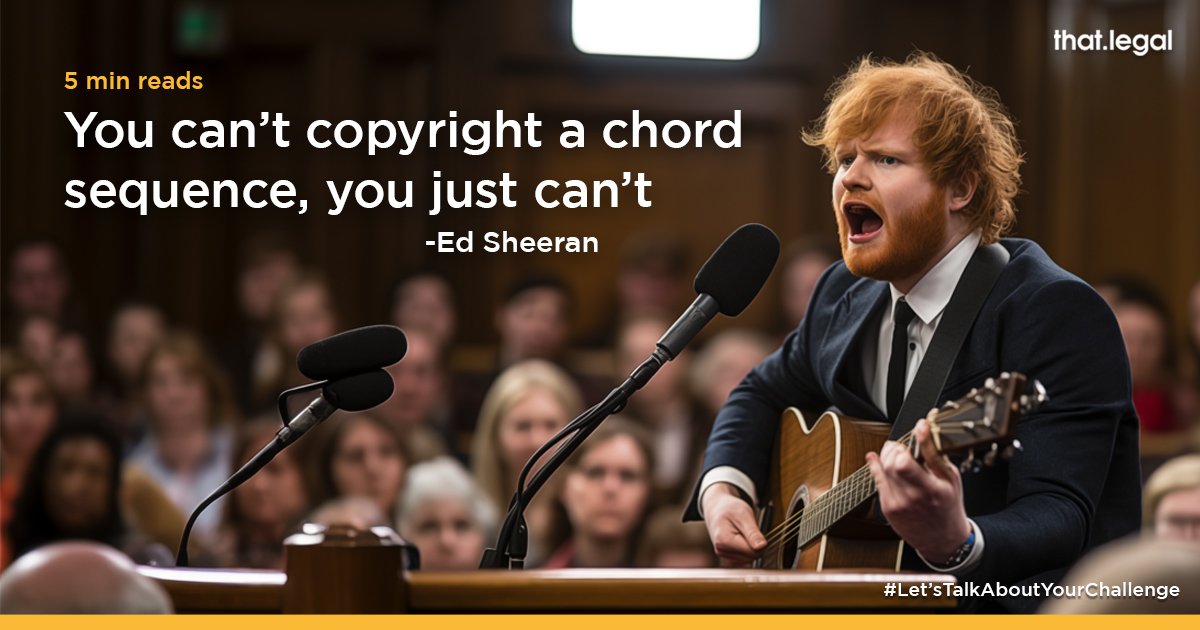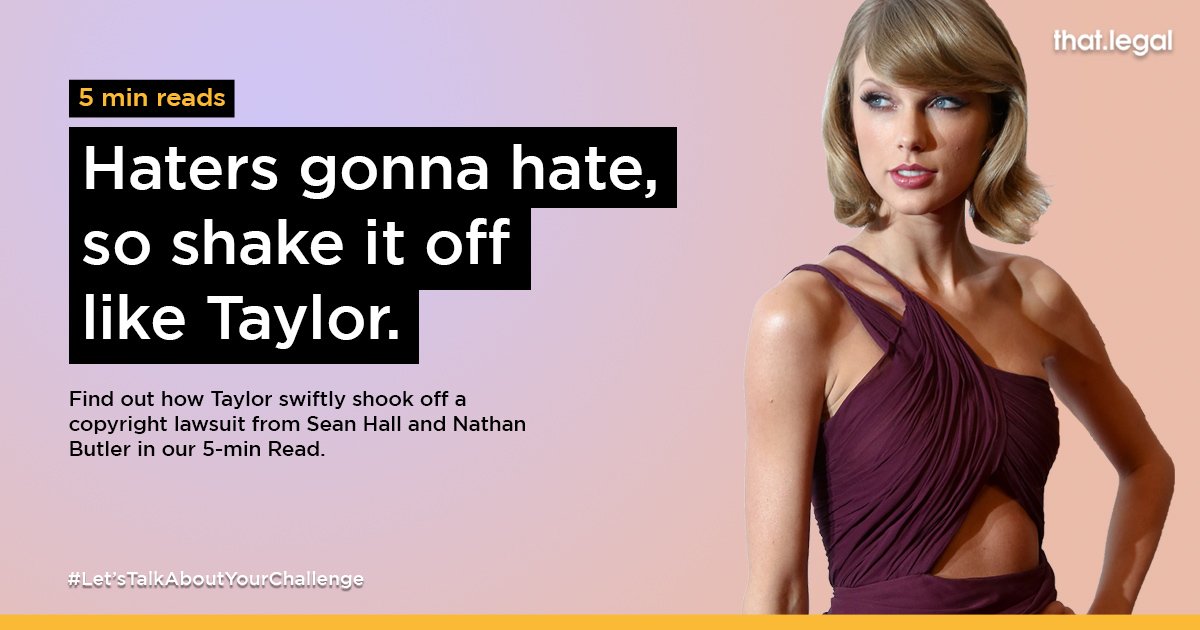Why Ed Sheeran was sued for ‘Thinking Out Loud’
Ed Sheeran is an artist who needs no introduction. With numerous hit singles and four Grammy wins under his belt, Sheeran has undeniably made his mark on music over the past decade. He has sold over 150 million records worldwide, making him one of the world’s top music artists.
A slightly lesser-known fact is that Sheeran has a surprisingly prolific work ethic. He reportedly writes three songs a day, five days a week - a song in the morning, a song in the afternoon, and one more before going to bed.
The British singer-songwriter will be performing in Singapore this month, and as we were Thinking Out Loud, we were reminded about a copyright lawsuit that he won in 2023 in relation to this song.
Even the Perfect have their critics
Being one of the most successful musicians in the world does not mean that Sheeran is short of detractors. Some critics have panned his songwriting for being formulaic and simplistic. For example, in a 2017 review of Sheeran's album ‘÷’, The Guardian critic Alexis Petridis wrote, "Sheeran's songs are all constructed around the same basic principles: a simple chord sequence, a catchy melody and a focus on emotional directness."
In 2018, Sheeran was sued for copyright infringement, and was ordered to stand trial in the US over claims he copied his hit song 'Thinking Out Loud' from Marvin Gaye's 1973 song 'Let's Get It On'. A judge denied Sheeran's bid to dismiss the case, stating a jury should decide on the similarities between the songs.
This was a major blow to Sheeran. He knew that if he lost the lawsuit, it would damage his reputation and career. ‘Thinking Out Loud’ was reportedly the last song he wrote for ‘X’ (which is his second studio album), and also his personal favourite.
Accusations of infringement
The claim was lodged in 2018 by the heirs of the ‘Let’s Get It On’ co-writer Ed Townsend, and a company called Structured Asset Sales, which had acquired a portion of Townsend’s estate. Seeking $100m in damages, they alleged that Sheeran and his co-writer Amy Wadge "copied and exploited, without authorisation or credit".
The plaintiffs argued that “the combination of the chord progression and the harmonic rhythm used in Thinking Out Loud is substantially similar to Let’s Get It On, and thus infringes the work”. Ed Sheeran’s defence was that the song was independently created and was born from an “emotional conversation” between him and the co-writer, Amy Wadge.
In court, Sheeran said he would quit music if he lost his copyright trial. He reportedly said of a prospective guilty verdict: “If that happens, I’m done, I’m stopping.” Subsequently, he acknowledged that “[n]o one’s saying that songs shouldn't be copyrighted… but you just can’t copyright a chord sequence. You just can’t”.
During the jury trial, Sheeran whipped out his guitar during his testimony to demonstrate to the jury that the same chord progression that he used in Thinking Out Loud, could be used in a multitude of different songs. In an interview with Howard Stern, gave us a glimpse of his performance to the jury, playing hits such as “Have I Told You Lately That I Love You”, “People Get Ready” and “Just Like a Woman” using the same chords as Thinking Out Loud.
(Fun fact: Sheeran names his guitars. They are: Lloyd, Felix, Cyril, Trevor, Keith, Nigel and James The Second.)
No monopoly over a basic musical building block
Both judge and jury ruled in favour of Ed Sheeran. Judge Stanton held that “it is an unassailable reality that the chord progression and harmonic rhythm in ‘Let’s Get It On’ are so commonplace, in isolation and in combination, that to protect their combination would give ‘Let’s Get It On’ an impermissible monopoly over a basic musical building block”. He also added that this same chord progression had been used by multiple other songs before Let’s Get It On was written and between the time Let’s Get it On and Thinking Out Loud were written.
During her closing argument to the jury, Ilene Farkas, Ed Sheeran’s lawyer, argued that “[w]e all benefit from artists being free to create and to build on what came before them… [otherwise] creativity will be stifled for fear of being sued.”
At That.Legal, we agree strongly with this argument. One of the main purposes of copyright law is to encourage innovation and creativity. If ‘Thinking Out Loud’ was deemed to infringe on ‘Let’s Get It On’ because it shares the same chord progression, creativity would not be encouraged, it would be stifled. It would set a thoroughly bad precedent and young, budding artists would live in constant fear that their creation of original songs could potentially result in expensive litigation.
This is not to say that songs should not be protected by copyright, instead that copyright should not be granted over “basic musical building blocks” such as a chord progression. The chord progression in question - I, iii, IV, V - is one of the most common chord sequences in pop music.
A huge number of the pop hits in the last 20 to 30 years have used this exact same chord progression. This was demonstrated by the comedy band, Axis of Awesome, in their 4 Chord Song:
It also bears noting that there are many aspects of a song that may be copyrighted, such as its lyrics, melodies, and arrangement. It is these unique features of a song that should be protected, and not chord progressions. For an illustration of what a copyright lawsuit might look like vis a vis the lyrics of a song, have a look at our other articles on Taylor Swift:
A Perfect result
One might say that the conclusion of this case was a Perfect result for Ed Sheeran. Though he was “unbelievably frustrated that baseless claims like this are allowed to go to court at all”, we are glad that his threat to quit music did not come to pass.
His clever demonstration of the similarities between the chord progressions of many songs during his testimony in court showed a deep understanding of music theory and songwriting techniques, as evidenced by his seamless transition between different songs and genres. Sheeran’s ability to create emotion and connect not just with his audience but with the court underlines the fact that he is a master of his craft and deserves to be considered one of the best songwriters in the world.
Welcome back to Singapore, Ed.
Follow us on social
If you like our content and would like to receive our updates in a timely manner, follow us on your favourite social platforms. Alternatively, if you have a query about intellectual property law, feel free to reach out to us.
Disclaimer
This article does not constitute legal advice or a legal opinion on any matter discussed and, accordingly, it should not be relied upon. It should not be regarded as a comprehensive statement of the law and practice in this area. That.Legal LLC represents neither party in this dispute and is not privy to any confidential information pertaining to the parties. All facts stated herein are compiled from publicly available sources. If you require any advice or information, please speak to a practicing lawyer in your jurisdiction. No individual who is a member, partner, shareholder or consultant of, in or to any constituent part of That.Legal LLC accepts or assumes responsibility, or has any liability, to any person in respect of this article.




